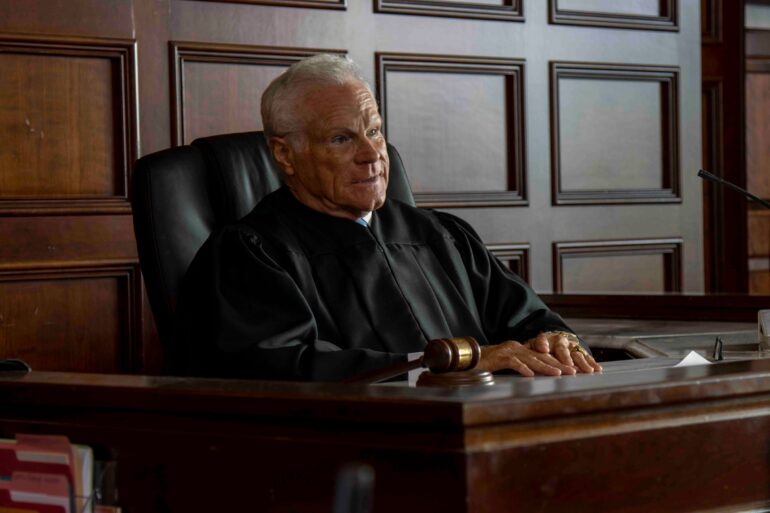With an impressive filmography as an actor that stretches past 40 years, David Keith has run the gamut of film genres, from drama, to horror, to action adventures and suspense, and has even directed several films, including the cult favorite The Further Adventures of Tennessee Buck from 1988. Not just a leading man, but also an established character actor in notable features such as 1990’s criminally underrated The Two Jakes with star and director Jack Nicholson, Keith continues his path as a character actor in the strong dramatic suspense film Walden, starring Emile Hirsche as a court stenographer who discovers he has a brain tumor and uses what time he has left to seek private justice on people who’ve escaped the court’s justice. Keith plays Judge Boyle in the film, and he has one of the most important roles in the picture that has enough plot in it to fuel several movies at once. Keith took some time to discuss Walden, as well as some selected films from his career.
Thank you, David, for having this chat with me.
Thank you for asking for it.
You know what? I never do these anymore, but The Further Adventures of Tennessee Buck is a personal favorite of mine. I couldn’t say no to this.
Oh, wow.
Let’s start with Walden, though, because that’s what we’re here to talk about. You’re at a point in your career where you’re playing very seasoned characters now.
(Laughing.) That’s one way to put it! I like that. Seasoned. That’s a good word for me.
You’re very stately in the movie. The movie is surprisingly strong. It’s got a couple of great moments for you. What drew you to this material and the role itself?
Well, let me explain something. We have a production company that’s based in Atlanta, and an investor in Florida, and we’ve come together and made three films now. Walden is our second. I’ve got an EP credit on the first two, and I’ve got an executive producer credit on the one we’re in post-production on called Degenerate, a poker movie, about degenerate gamblers. The production in Atlanta got the script, and the husband – it’s a husband and wife team – they got the script and read it and they asked me if I saw a role in this. I said, “The judge.” So they suggested I talk to Mick Davis, so I flew out to LA to talk with Mick, and he walked in and the first thing he says to me while I’m sitting there is, “The first thing I want to get out of the way is I want you to play the judge.”
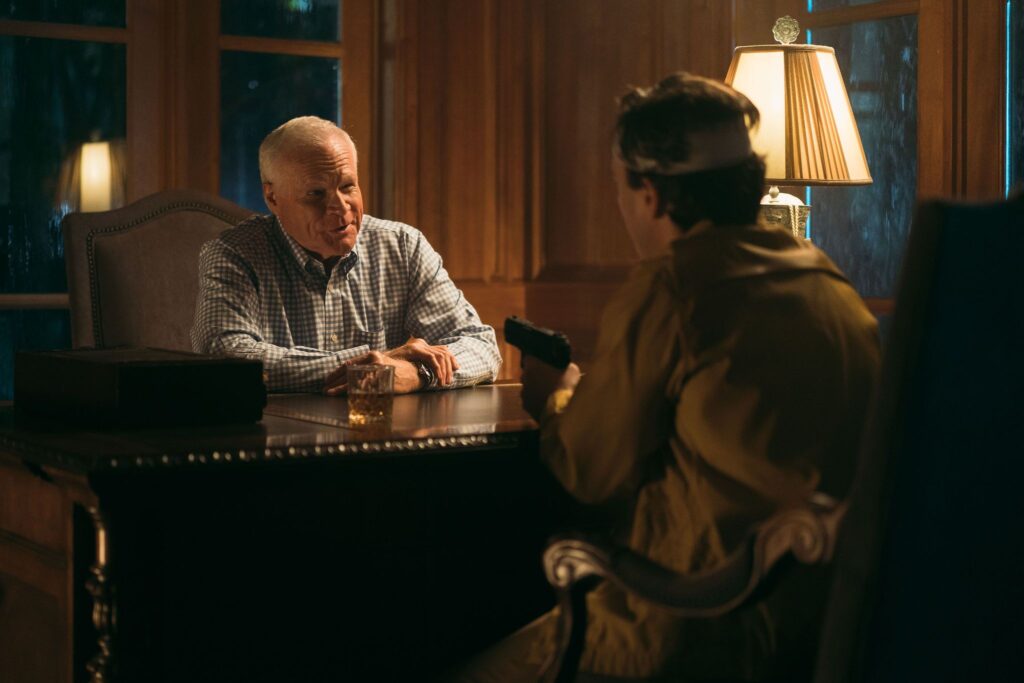
This is a major role in the film and there’s plenty for you to work with. It’s not just a nothing role – you’re one of the main players in the film, and you did a fantastic job. You played great opposite Emile Hirsch, who did a great job too. Say something about working with Emile.
Terrific to work with! The long scene we share at the end … well, all our scenes together were great, but the long scene we have together was a real pleasure because I love being across from somebody who really has the deep chops. He does. Off camera, I said to him, “When you get the line right, it’s almost like a tuning fork that rings. The ring of truth when you get a line right.” He said, “Yeah, I know what you mean.” It was great to be in a scene where the tuning forks were on at the same time. Really nice and rich evening we spent together shooting that scene. He’s great. He’s hilarious off camera. He’s real chameleon-like. He would sit around with that stenograph working it. He was just immediately Walden. It was very different from who he is in real life.
I won’t give any details of the plot away, but your character is very layered and it’s not just what we see or think at first. Right away when we see you draw the gun on that murderer father character in the courtroom, that was something I’ve never seen before. It was very surprising. For a judge to pull out a canon like that in a courtroom … it was very surprising. It may have foretold some surprises that were coming. What do you think?
Well, I think Judge Boyle is so comfortable with his power. In that town, he’s the man. In that courtroom, of course. He is a guy that is … in his mind, he’s not just a judge – he’s the king. He won’t take any bullshit in his courtroom, and so I love that when I got to that point in the script where he pulls the pistol out. He’s layered, but the main, central core of him is how comfortable he is in this town. How completely invulnerable he feels to anything. He’s in control, and he’s been in control for decades.
I don’t really know what genre Walden falls under. It’s a cross-pollination of multiple genres; it’s a mystery, it’s a drama, it’s kind of funny too sometimes, but then it’s really dark as well, like super mega dark. How would you categorize the film?
It’s also got a love story.
That’s right. It’s also a love story.
And there’s a stenography competition.
Yup, it’s got that angle too.
It has a lot of plot, a lot of avenues. It checks almost every box for almost every moviegoer. It’s got something for everyone. So many action type movies or thrillers are just super linear. You identify the problem, and the protagonist solves the problem. This movie has multiple full-fledged plots in it. It’s chock full of nuts.
I’m going to backtrack a bit now. I just watched The Lords of Discipline the other night, and it’s still a great movie and holds up very well. That was an early one for you. What do you remember about working on that one?
Well, the first thing I remember was that it was the first time I’d been out of the United States. We shot it in London. I loved being in London doing that movie. Making money, on per diem, great, great city. When you ask an actor how they like making a movie, there’s two things: Where they shot it and what life was like in that city, and maybe what book they were reading because you’re usually just sitting around waiting to do your shot. I had great camaraderie with the guys … that was very enjoyable. It was a strong movie. Mark Breland was great. I loved getting to know him and working with him on his acting scenes. That was at Frank Roddam’s request. I worked all the time. No days off on that one.
A few years later you were in another fantastic, totally underrated movie called White of the Eye, which doesn’t get discussed enough. It’s a great movie.
Thank you.
That was a really intense movie, and you give a great performance in it.
It was very intense. Donald Cammell, who wrote it with his wife China, directed it. He committed suicide a few years ago. He’d never directed before, and he was a little out of his element. It was a very collaborative effort. We had two directors of photography, which was weird. The two of them and Donald and I worked through the scenes together so that everyone was happy. Rather than just have the director saying “This is what we’re shooting, go shoot it.” It was much more collaborative.
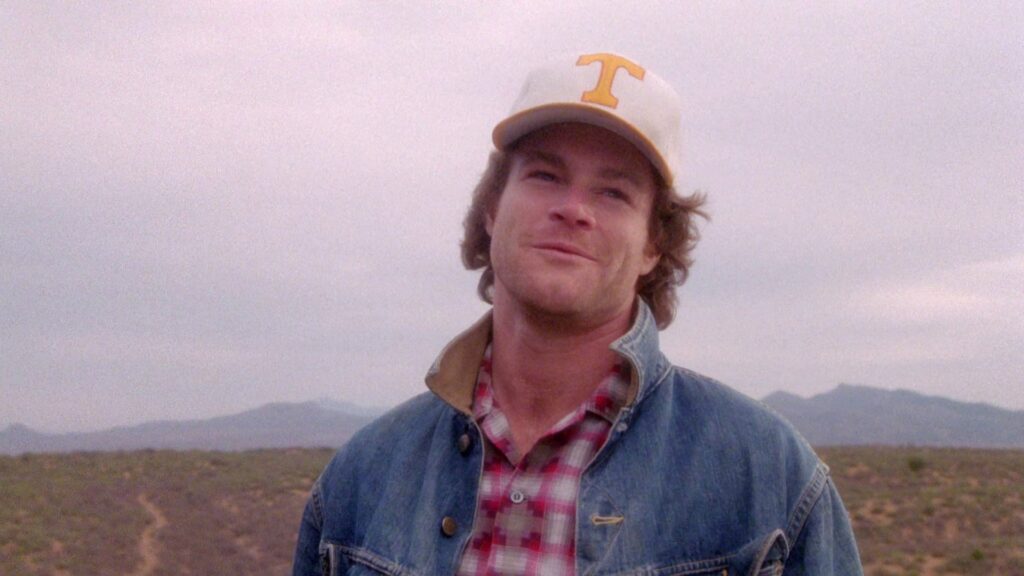
The film has picked up a bit of a cult following over the years.
I kind of figured it would.
I wanted to talk a little bit about The Further Adventures of Tennessee Buck, because, first of all, you directed the film. This was your second film as a director. How did you end up choosing this one to direct as your second effort in that position? It came at such a fun time in the mid – late ’80s.
I’ll tell you how it happened. The company that made the film wanted me to play the lead role. It was kind of a low budget film. I had some heat around that time, and my agent said, “If you really want David to play this role, let him direct it because he’s dying to direct.” So they said, “Okay.” They gave me a smaller film, which ended up being called The Curse first. So I did that. We then went to Sri Lanka, and we ended up doing The Further Adventures of Tennessee Buck. It was tough, man. It was 110 degrees every day. 100% humidity. Leeches, flies, mosquitos. It was a hardship case, but it was fun. There was a cartoon in The New Yorker, and I loved it and it reminded me of me. It was a seal balancing a ball on its nose flipping its flippers, and the caption was “I wanna direct! I wanna direct!” It’s true. Performers all want to be in the catbird seat. It was thrilling for me to do that. I didn’t direct since then other than a student film at the University of Tennessee, but now with this new production company I’ve been with for three years, we’ve done three films, and this last film Degenerate I’m the creative executive, so I’ve been involved with that process all the way through, and that’s kind of better than directing because so many directors are way better than me with a camera. I still get to put my two cents in, so it’s the best of both worlds.
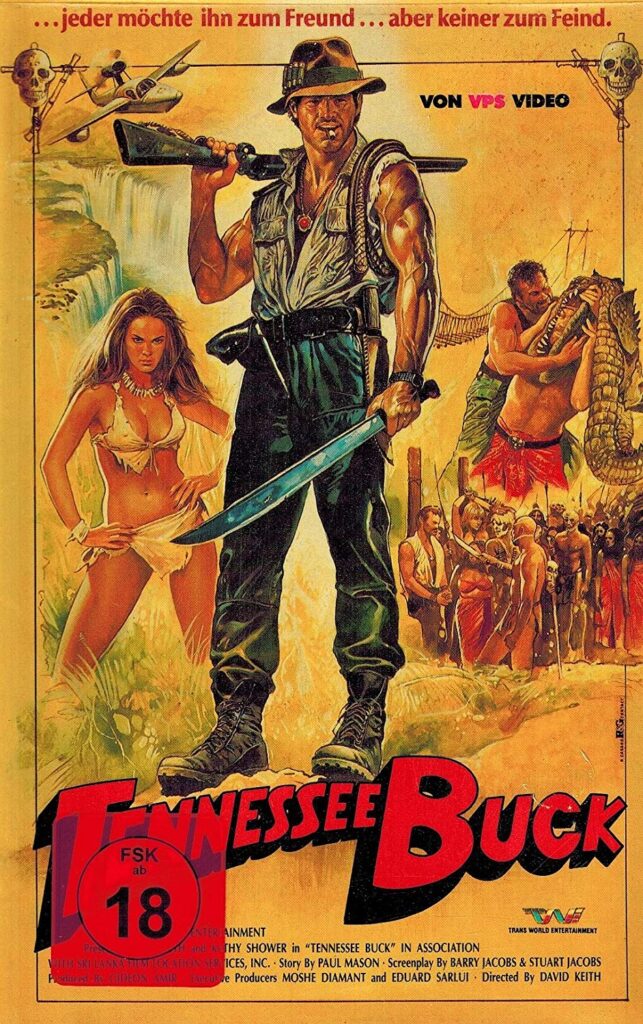
Tennessee Buck is a fun role, obviously, but what was it about the movie that drew you in?
The only thing about it that made me do it was the chance to direct it. I don’t know if I would’ve gone to Sri Lanka only as an actor. I may have passed on it. My agent was right. All for the chance to direct it.
This movie has endeared itself into my heart for a lot of reasons. I love the Indiana Jones-styled adventure that it’s going for, that pulpy men’s adventure aspect. Did that appeal to you as an actor and not just as a director? That type of movie was really pulsing in the film market at the time. How were able to tap into that vein?
You know, I don’t recall considering that other than doing some rewrites on it. I rewrote a lot of that script. When we got the movie it was just a straight-ahead adventure film, but it was pretty cliché. I said, “Listen, let’s make this movie kind of a tongue in cheek adventure. Let’s play that up. So I tweaked those things and added some comedy. I added Brant von Hoffman, who was a stand up comedian, in the role of the husband of the couple who hire me to take them on a hunt. I tried to add as much comedy as I could to the movie to make it as light and fun as possible.
You can feel it when you’re watching it that it’s just a fun movie. Talk about working with Kathy Shower. She was coming from doing the pictorials and was known for that, but say something about working with her and directing her. You guys had some playful chemistry in the movie.
She was great. She was totally there. She was a real trooper. In that jungle setting, we didn’t actually shoot in the real jungle because we wouldn’t have lasted five minutes. We actually shot in a jungle preserve. We had a river and some things, but it wasn’t an actual jungle. It was still very hard on her. The heat and the bugs. When the cannibals capture us and tie us up, they pull this vine off the ground to tie us up with it, right? Because they would never have rope. So they pull up this vine that turned out to be this mega tropical poison ivy type of thing. Everybody broke out in blisters, even in your hair and scalp, and all over my beard. Kathy had to be sent to LA and put in the hospital for a week – I can’t remember how long she was gone – so that she could recover. She was covered in the blisters. It was a really tough time for all of us. She was a trooper. She was great.
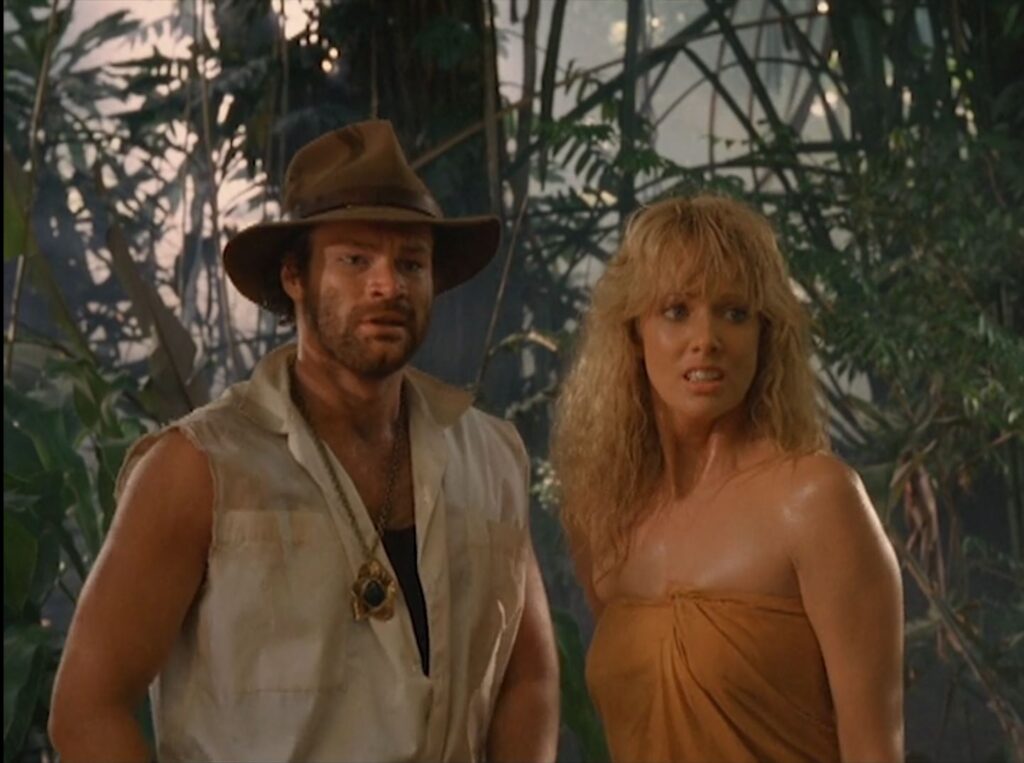
Part of the reason why the video was so popular and I could never find a tape to rent because it was always checked out was the infamous hot oil rubdown. It’s classic. What do you remember about shooting that scene?
Well I put the scene in the movie for obvious reasons. I asked everyone involved if they were fine with it, and everybody was, and Kathy was totally cool with it, and we shot it. We shot it as quickly as possible. It didn’t go on for hours. We got it in one take. One or two takes.
Was a sequel ever discussed?
Uh, no. It wasn’t a big box office success. It was more of a success on Cinemax where it got most of its play. Nobody really considered a sequel.
It should get a DVD or some kind of a Blu-ray release or something to remind people how fun it is. It’s languished on VHS, which is lamentable. Do you have any ideas or know the status of that?
No, I’m no longer in contact with anyone who made that movie. I don’t even know if the company still exists. Zero news or updates.
Anything you’d like to say to fans of Tennessee Buck?
Hey, it’s got a lot to offer! Enjoy!
Shortly after Tennessee Buck you were in another highly underrated film called The Two Jakes with Jack Nicholson. You have some great moments in that movie, and the film is pretty awesome on the whole. I’m a huge fan. What do you remember about working on it?
Oh, how great Jack was as a director. He was just, you know, he’d say, “Do whatever you want to do and hold up your finger for take one, two fingers for take two, three for take three,” and he’d just roll the camera. He understood being an actor better than any director I’ve ever worked for. He really was my favorite director of all time. As far as me working as an actor.

I recently did an interview with Jeff Fahey and I asked him about a movie called Temptation that the two of you co-starred in. He had nice things to say about you. Do you have any memories about working on that one?
Oh, yeah. Jeff is a great guy. He worked all the time on that. I had some days off in South Beach. A lot more than he did. Like I said, when you ask about a film the first thing that comes out of my mouth is where we shot it.
Last thoughts on Walden: Your hopes for the film, the film’s release, anything else you’d like to say, now’s the time.
I hope everyone likes it. The main thing is revenge. All of us want revenge on bad guys, I think. Even bad guys.
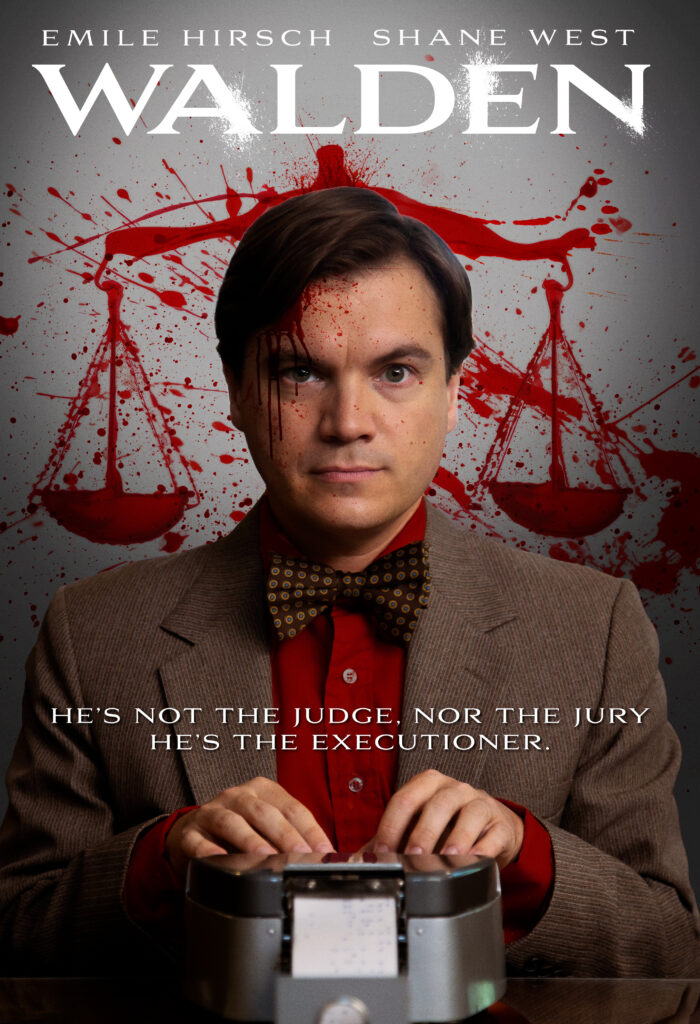
Walden is on demand an digital on December 12th from Uncork’d Entertainment.


